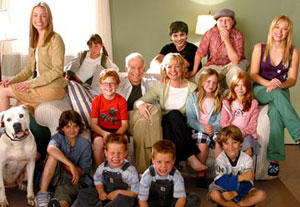[For the audio version of this homily, click here: Seventh Sunday 2004]
Once upon a time—a couple of decades ago to be exact—Super Bowl halftime shows were simply about filling a time gap in the middle of the biggest football game of the season. In recent years, however, they seem to have taken on a life of their own. College marching bands with baton-twirling girls have been replaced by glitzy Hollywood productions, complete with pyrotechnics and every other “extra” you can possibly imagine.
And the producers of these flamboyant shows have clearly made a concerted effort to target the youth of America. Their purpose has been, first of all, to get young people to tune in to the Super Bowl (even if they’re not football fans)—and then to keep them glued to their seats at a moment when they might be tempted to leave the game and go do something else.
And so it was a few weeks ago, during the Patriots-Panthers game. I don’t think I need to go into great detail here. You all know the major players in that fiasco: Janet Jackson and Justin Timberlake. But let’s be fair and honest: his act of pulling part of her top off was definitely not the only assault on decency that took place during that performance! Justin and Janet were not alone! Some others who performed were dressed immodestly; still others made suggestive motions with their hands and bodies. And how about the commercials that were aired throughout the game? Morally speaking, several of them were just as bad as the halftime show, if not worse.
In my homily this morning I want to address the young people in particular, although my message has an application to everyone. You young men and women, after all, were the target audience of the show—and you were also the target audience of some of the most offensive commercials. Consequently, you need to know—and I think you deserve to know—what the producers of this trash really think of you!
Now I’m sure that if we questioned the people at MTV who were responsible for putting the program together, they would tell us that they have the greatest possible respect for young people—for teenagers and young adults alike. Those who designed the offensive commercials would no doubt say the same thing. My response to that is: What people say is far less important than what people do. As the old saying goes, “Actions speak louder than words.”
So, regardless of what they might tell you, based on what they DID that night, the people at MTV—along with Justin Timberlake, Janet Jackson, and some of the other performers and advertisers—actually gave you the following message:
You young people, in our estimation, are not subjects to be respected; you are objects to be used for our benefit—so that we can get rich; so that we can generate some much-needed publicity for ourselves.
In our opinion, you are no better than animals, no better than dogs in heat. And so, we will appeal to your base instincts. We will not appeal to your distinctively human qualities: your youthful idealism, your desire to give yourselves to others in service, your desire to make the world a better place. No way! We will appeal to your concupiscence, to your lust—because that’s the means by which we can manipulate you the easiest. How you’re affected by what we do is irrelevant to us. We don’t care if you do to your girlfriend what Justin did to Janet; we don’t care if you hurt one another emotionally or treat one another as playthings. When push comes to shove, we only care about ourselves.
That, my young friends, was the message they gave to you by their actions. They would probably never acknowledge it publicly, but it’s still the truth.
Now, in all fairness to these Super Bowl producers, performers, and advertisers, they are not the only ones in the world who look at other human beings in this way. This tendency to objectify and manipulate others is a phenomenon that’s found almost everywhere. But what we need to be clear about today is how incompatible this perspective is with the biblical understanding of the human person. Biblically speaking, human beings are not objects to be manipulated, they are subjects to be respected!
This, not coincidentally, is a lesson we learn from the 3 Scripture readings we just heard at this Mass. How providential it is that God has given them to us today. In the first, from 1 Samuel 26, David has the chance to kill King Saul, but he refuses to do so. Saul—without any justification—had been pursuing David for quite some time in order to kill him; but David refuses to retaliate against the king when he has the chance, because he recognizes that Saul is “the Lord’s anointed.” The truly Christian view is that every human being is “anointed” with the image of God from the moment of conception until the moment of natural death. That’s why the Church opposes abortion, embryonic stem-cell research and every other attack on innocent human life. And that’s why we need to oppose those evils if we call ourselves Catholic Christians.
Our second reading from 1 Corinthians 15 reminds us of yet another reason why other people are to be respected: because Christ died for them, and wants to give them eternal life! That’s the implicit message of verse 49, where St. Paul writes, “Just as we have borne the image of the earthly one [Adam], we shall also bear the image of the heavenly one [Jesus].”
This, by the way, is also the message of Mel Gibson’s movie on the Passion of Christ which debuts in theaters this Wednesday. Jesus died on the cross for EVERYONE—for Gentiles AND for Jews! (You mean Diane Sawyer doesn’t understand that?!!!) The Passion of Jesus Christ was NOT an anti-Semitic event! Quite oppositely, it was actually the most PRO-SEMITIC EVENT in the history of the world!
Finally, consider today’s Gospel text from Luke 6: “Love your enemies, do good to those who hate you, bless those who curse you, pray for those who mistreat you . . . etc.” Let me tell you something, my brothers and sisters, if the people in Hollywood and at MTV are right, and human beings are simply objects to be used and manipulated, then it doesn’t matter what you do to others! You can hate your enemies as much as you want to; you can do to your girlfriend what Justin Timberlake did to Janet Jackson—and worse; you can take vengeance on others and curse your enemies, and do 1,001 other evils—it doesn’t matter!
On the other hand, if the biblical understanding of the human person is the right one, then we had better take these words of Jesus very seriously, as difficult as they might be to live out!
Every man and woman is created in the image of God and has an immortal soul, and we must treat them accordingly. We can’t let our raw emotions dictate our conduct toward them in difficult situations—as much as we might be tempted to. That’s what Jesus is telling us here.
All this having been said, you young people are now confronted with a very important question. It’s a question that all of us face, young and old—and it’s a question that we all answer, even if we’re not conscious of doing so. The answer we give ultimately determines the kind of person we become in this life. The question can be expressed in this way:
Who’s right—the people at MTV (and those who think as they do), or the people who wrote the Bible?
Which of those two groups has the proper understanding of the human person: the one that says human beings are objects to be manipulated for pleasure or profit, or the one that says human beings are subjects to be respected?
I take some encouragement from the fact that so many adults were upset with this year’s Super Bowl halftime show and with some of the commercials that aired during the course of the game. Perhaps more adults are finally realizing that there’s something radically wrong with MTV’s philosophy of the human person, and are ready to do something about it.
Well, better late than never.
May the young people of this parish—and this country—not wait so long.



